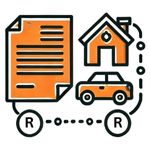
In South Africa, many people struggle to pay rent on time due to irregular income or unexpected expenses. This can happen because of job loss, late salary payments, or medical bills. When rent is due and there’s no cash available, some tenants consider taking a short-term loan to avoid eviction or penalties. While borrowing for rent is common, it should be handled carefully.
Key Takeaways
- Short-Term Loans Can Cover Urgent Rent Needs: Rent loans are often used in South Africa to manage short-term gaps caused by late salaries or emergencies. They offer fast access to funds but should only be taken if you can repay on time.
- Tenants Are Legally Protected from Unlawful Eviction: Landlords must follow legal steps, including written notice and a court order, before evicting tenants. You cannot be removed or locked out without proper legal process.
- Alternatives to Loans Are Available: Instead of borrowing, tenants can consider payment plans, government aid, stokvel funds, or legal support to manage rent without adding debt.
Loans for Paying Rent
Rent loans offer short-term financial help to people who are struggling to meet their monthly rent. These loans are designed specifically for covering rental costs when money is tight, allowing tenants to stay in their homes during periods of financial difficulty. They are usually meant for short periods and give quick access to funds for urgent housing needs.
Compared to standard loans, rent loans can be quicker and easier to qualify for, especially if the lender understands the urgency of the situation. However, it is necessary to review the loan terms in detail, because interest rates and fees can differ widely depending on the lender and the type of loan. While these loans can offer quick relief, it is essential to have a plan for repaying the money on time, so you do not end up in a worse financial position later. By knowing how rent loans work and what to look out for, you can make better financial choices that protect your stability.
About Arcadia Finance
Secure a loan with ease through Arcadia Finance. Pay no application fees and choose from 19 trusted lenders, all fully registered with South Africa’s National Credit Regulator. Enjoy a smooth, reliable process with loan options tailored to your financial needs.
Rights of Tenants in South Africa
Tenants in South Africa are legally protected, even if they fall behind on rent. If you are worried about eviction, it’s useful to know what landlords can and cannot do.
- A landlord cannot evict you without a court order: Any eviction done without court approval is illegal.
- Landlords may not change the locks or remove your belongings before a legal eviction: This would be considered an unlawful eviction.
- You must be given at least 24 hours’ notice before your landlord enters the property: This applies even if you are behind on rent.
- If you are in breach of your lease due to unpaid rent, you must get 14 days’ notice before eviction steps can begin: The notice must explain the breach and allow time to fix it.
- If you settle the outstanding rent within 14 days, you have the right to remain in the property: The eviction process must stop once the payment is made.
- All evictions must follow the legal process and require a court order: Landlords cannot remove tenants without going through the proper procedure.
If you’re curious about how basic expenses, from groceries to utilities – how they stack up across South Africa’s major cities, check the cost of living in South Africa. It will help you decide whether a rent loan is a stop-gap or a long-term necessity.

Loan to Pay Rent: Can You Really Do That?
Legally, yes. There is nothing stopping you from using a loan to pay your rent. Once a lender has approved your application and released the funds, you are generally free to use the money as you see fit. However, just because it is legal does not mean it is financially wise.
Most banks and registered credit providers strongly advise against using loans to cover everyday or recurring expenses like rent. Institutions such as Capitec, FNB and Absa outline in their lending terms and customer guidance that loans should ideally be used for once-off, planned costs such as medical bills, school fees or car repairs.
Using credit to pay rent can be a red flag that your monthly expenses are outpacing your income. If this becomes a pattern, you may find it difficult to qualify for future credit, as lenders will take note of your debt behaviour. It could also raise concerns under the National Credit Act, which requires lenders to assess whether a loan is truly affordable for the borrower.
While it is not against the law to use a loan for rent, doing so may lead to a cycle of debt that becomes difficult to escape. It is worth considering whether this short-term fix could create a bigger financial problem later on.
Are you struggling to make rent? Here’s what to do. This guide will walk you through negotiating payment plans with landlords, tapping into relief grants and more practical steps before you borrow.

When It Makes Sense to Borrow for Rent in South Africa
In South Africa, borrowing to cover rent can be a practical solution in certain situations. Understanding when it’s appropriate to take out a loan for rent can help you manage your finances responsibly and avoid unnecessary debt.
Temporary Cash Flow Issues
If you’re experiencing a short-term financial setback, such as a delayed salary payment or unexpected expenses, borrowing to pay rent might be a reasonable option. For instance, if you have a stable job and are confident that your income will resume shortly, a short-term loan can bridge the gap and prevent late payment penalties or eviction notices. It’s crucial, however, to ensure that you can repay the loan promptly to avoid additional financial strain.
Unexpected Expenses
Life can throw unexpected financial challenges your way, such as medical emergencies or urgent car repairs. In such cases, if these expenses coincide with your rent due date, taking out a loan can help you meet your rental obligations without compromising on other essential needs. Again, the key is to have a clear repayment plan in place to avoid falling into a cycle of debt.
Protecting Your Credit Record
Maintaining a good credit record is essential for future financial opportunities. If missing a rent payment could negatively impact your credit score, borrowing to pay rent might be a strategic move. By ensuring timely rent payments, you protect your creditworthiness, which can be beneficial when applying for future loans or credit facilities.
Avoiding Legal Consequences
In South Africa, landlords have the legal right to take action against tenants who default on rent payments. This can include eviction proceedings or using your rental deposit to cover unpaid rent. Borrowing to pay rent can help you avoid these legal consequences, provided you have a solid plan to repay the loan.
When to Reconsider Borrowing
While borrowing can be helpful in certain situations, it’s not always the best solution. If you’re consistently struggling to pay rent due to insufficient income or chronic financial issues, taking out a loan might only provide temporary relief. In such cases, it’s advisable to explore alternative solutions, such as negotiating a payment plan with your landlord, seeking financial counselling, or considering more affordable housing options.
Why Think About Getting a Loan?
Struggling to pay rent when you do not have the money available can cause a great deal of stress. You might receive a letter of demand, face late payment penalties, or worry that your landlord could use your rental deposit to settle the shortfall. In some cases, the lease agreement could even be cancelled altogether.
Taking out a loan can be a practical option if you are dealing with a short-term gap in your finances and expect some income in the near future. This can help you avoid falling behind on rent and reduce the pressure of trying to negotiate with your landlord without any money on hand.
Speak To Your Bank
A standard personal loan from your bank may be suitable, depending on your credit history. If your credit record is in good standing, your bank may allow you to increase the limit on your existing credit facilities. This could provide the funds you need without having to complete a full loan application.
On the other hand, applying for a new credit line generally involves more paperwork and a longer approval process.
Those with poor credit records, those who are self-employed and experiencing irregular income, or those who are unemployed, may find that their applications are declined.
Types of Loans That Can Be Used to Pay Rent in South Africa

Consider A Payday Loan
Payday loans are another way to access quick funds if you are short on rent. These loans are usually only helpful if you have part of your rent money already and need to make up the rest, as payday lenders typically offer smaller amounts.
It is also worth noting that payday loans come with high interest rates, which can make them very expensive if not paid back promptly.
You should only take a payday loan if you are confident you can repay it in full by the due date.
Although payday loan providers generally have more flexible lending criteria than banks, you will still need to provide documentation and go through an approval process. Not all applications are guaranteed to be accepted.

Use Personal Assets To Secure A Loan
Another option is to use something valuable that you own as security for a short-term loan. This could be a car, a piece of jewellery, or a high-value item like artwork. The loan amount is based on the assessed value of the asset you offer as collateral.
You will usually need to bring the item in for inspection. Once the lender assesses its value and you accept their offer, the funds are transferred to your account without much delay.
As long as you repay the loan and interest in full, the asset will be returned to you in its original condition. This type of loan can be processed quickly and often involves fewer checks than a typical credit application.

Personal Loans
Personal loans are unsecured loans offered by banks and financial institutions. They can be used for various purposes, including paying rent. The loan amount and interest rate depend on your credit score and income. Repayment periods typically range from 12 to 72 months, with loan amounts varying between R1,000 and R350,000.

Guarantor Loans
Guarantor loans involve a third party, usually a family member or friend, who agrees to repay the loan if you default. This can help secure a loan if you have a poor credit history. However, it places financial responsibility on the guarantor and can strain relationships if repayments are not made.

Alternatives to Taking a Loan for Rent in South Africa
If you’re struggling to pay rent in South Africa, a loan isn’t your only option. There are other ways to manage rental payments without adding more debt. Below are practical alternatives worth considering:
Talk to Your Landlord
Open communication is key. Many landlords would rather make a plan with a reliable tenant than face the costs and delays of finding someone new. Consider negotiating:
- A short-term rent reduction
- A payment extension
- A structured repayment plan for overdue rent
Being honest about your situation and proposing a realistic timeline shows responsibility and may lead to a workable solution.
Seek Government Assistance
The South African government offers limited but important forms of support. If you’re unemployed or in crisis, you may be eligible for:
- The Social Relief of Distress (SRD) grant, which provides temporary financial help
- Other forms of emergency relief, especially during times of national hardship or natural disaster
Check your eligibility on the SASSA website or visit a local office for assistance.
Look Into NGO Support
Non-governmental organisations (NGOs) can be a lifeline in tough times. A few worth reaching out to include:
- Black Sash, which provides social justice and human rights support
- Debt Rescue and similar agencies, which offer debt counselling and financial advice
These organisations may not pay your rent directly, but they can help you restructure your finances and access support you didn’t know was available.
Take On Part-Time or Gig Work
If you’re able to work, even temporarily, picking up a side hustle could ease the pressure. In South Africa’s growing gig economy, options include:
- Food delivery via Uber Eats, Mr D, or Bolt Food
- Tutoring, especially for school subjects or university-level courses
- Freelancing in areas like writing, design, admin, or social media management
Even a few extra hundred rand a week can make a difference when you’re trying to stay afloat.
Conclusion
Taking out a loan to pay rent in South Africa can be useful in urgent situations, but it must be done with care. Short-term financial help can prevent eviction and give you time to recover, but only if you can afford the repayments. Tenants have legal rights and should not be evicted without a court order. Before borrowing, it’s worth looking at other options like payment plans, stokvels, or government assistance. Choosing the right solution depends on your situation, and the focus should always be on long-term financial stability, not just short-term relief.
Frequently Asked Questions
Yes, some lenders offer rent loans to people with poor credit, but the interest rates may be higher, and approval is not guaranteed.
You may be charged late fees, your credit score can be affected, and the lender may take legal action if the debt is not paid.
No. Your landlord must follow legal eviction procedures, including giving notice and obtaining a court order.
Yes, payday loans or short-term online loans can be processed quickly, but they often come with high interest rates and fees.
You can speak to your landlord about a payment plan, use savings or stokvel funds, apply for housing support, or get help from the Rental Housing Tribunal.





